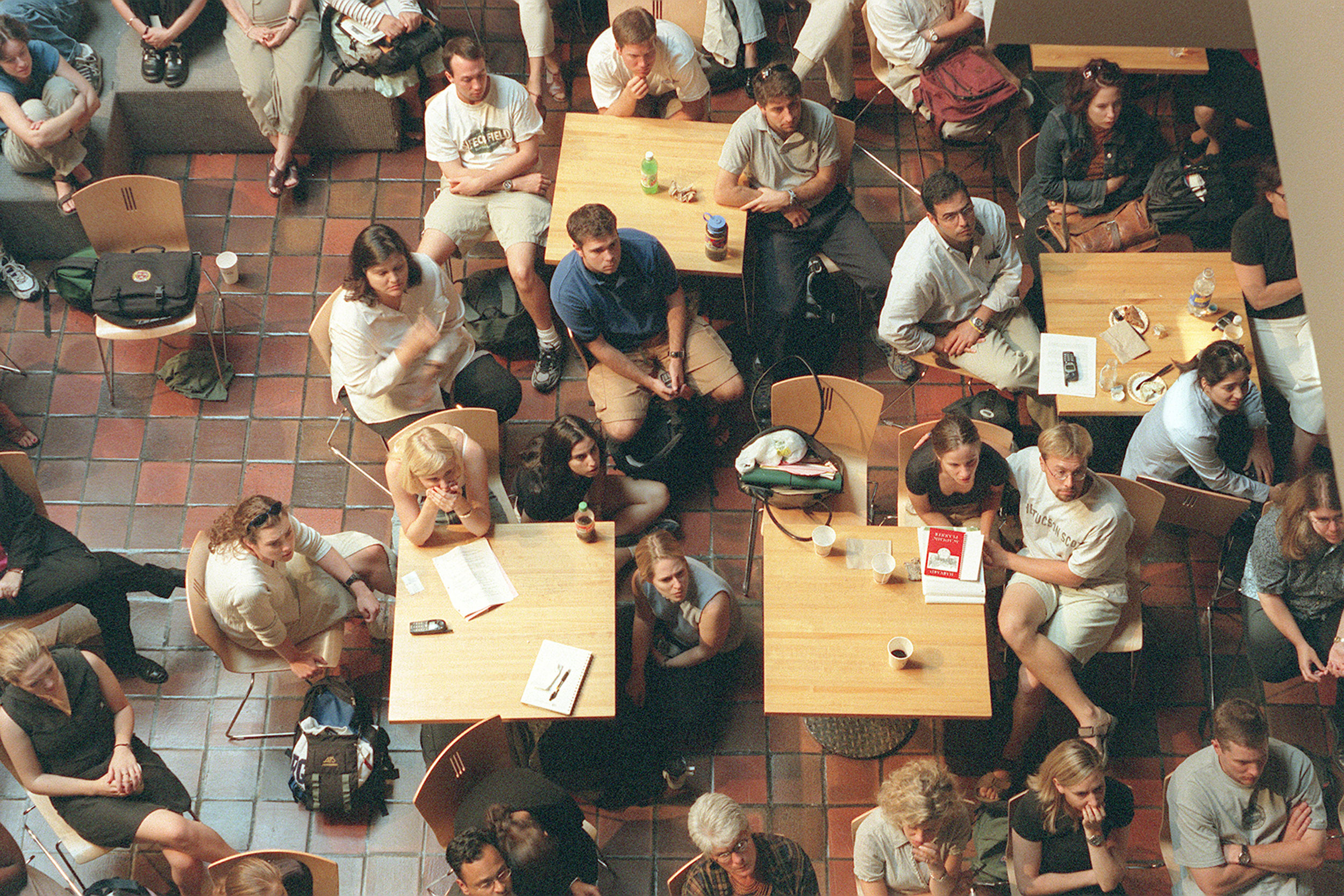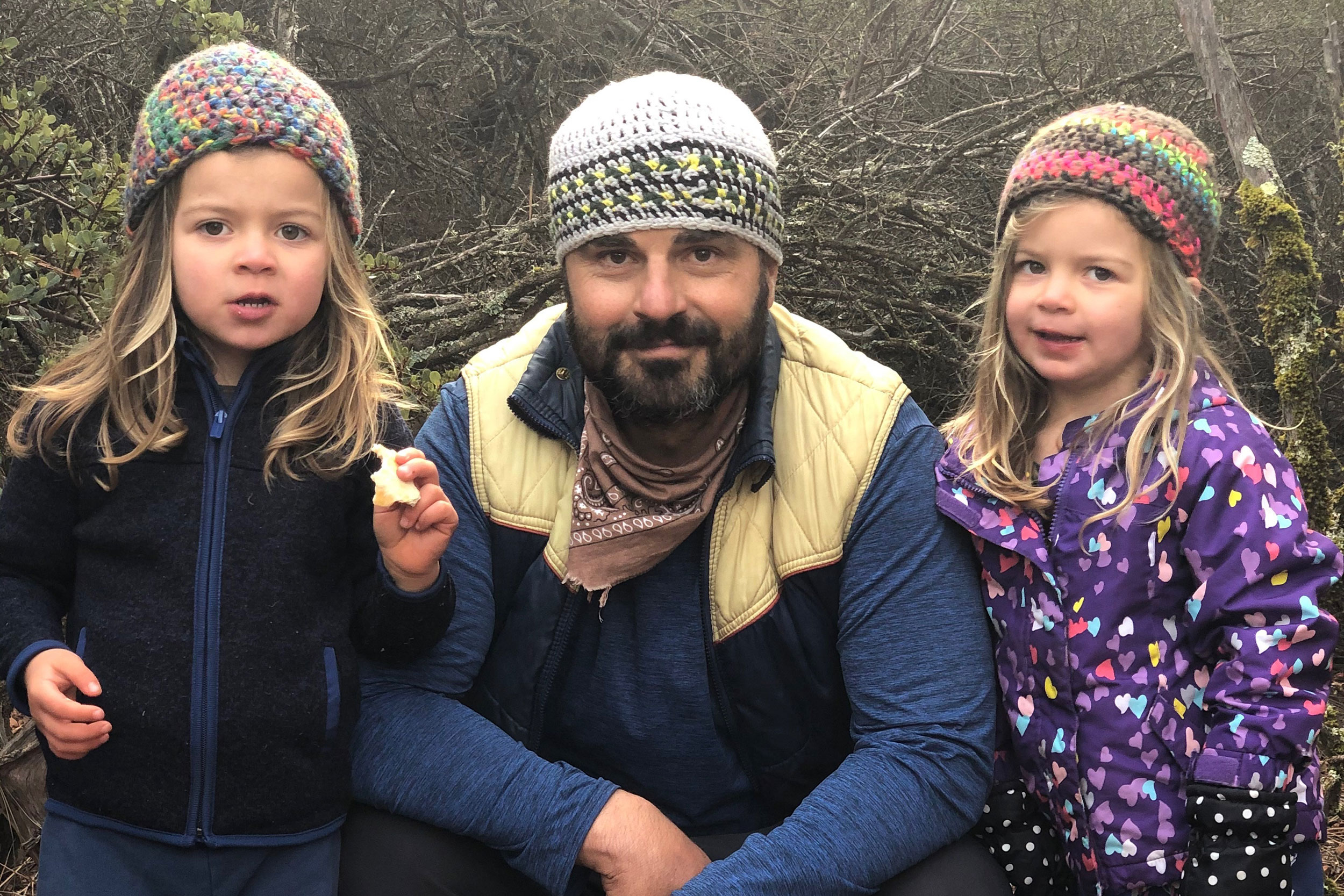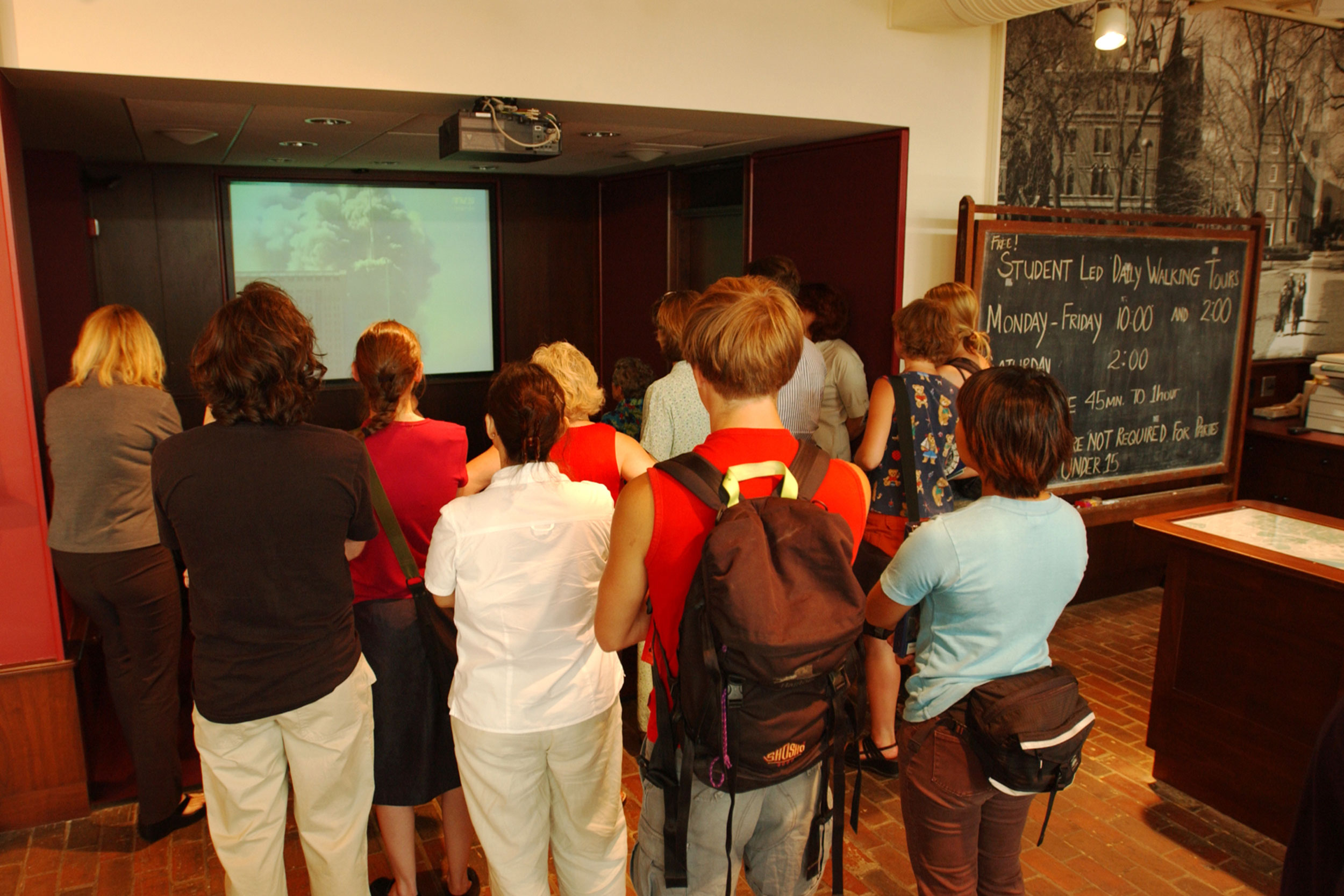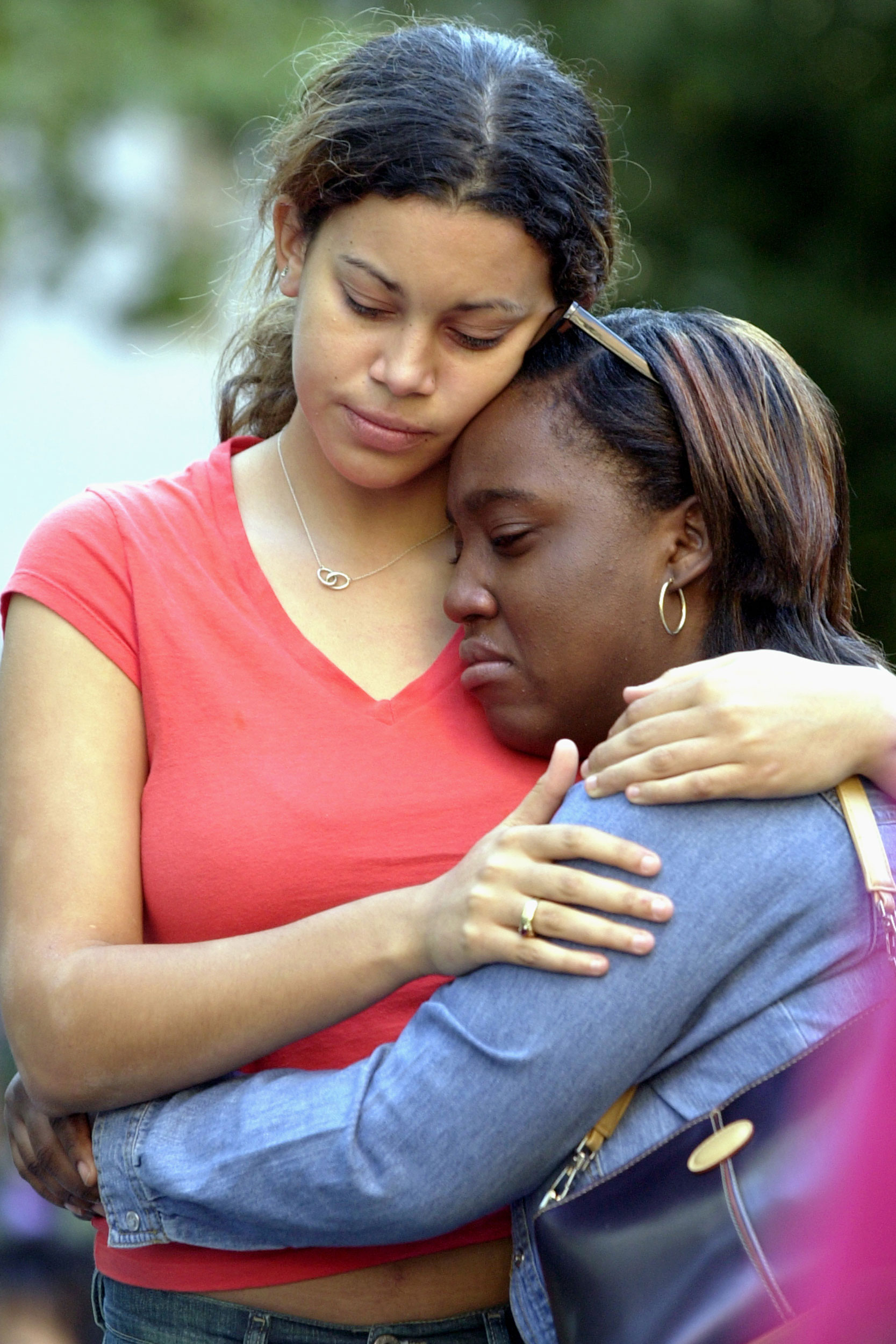
Hundreds of stunned students, faculty, and staff gathered at the Harvard Kennedy School as the horrors of 9/11 unfolded.
Rose Lincoln/Harvard file photo
The day of
Former students recall the confusion and fear of 9/11, the desire to do something, and the sense that everything would be different now
Grady Smalling rushed upstairs to the 5th floor walkup he had shared until recently with former Harvard football teammates. He had a sinking feeling as he rushed from room to empty room. Smalling, who had graduated and left Harvard’s leafy Cambridge campus for New York’s Chinatown two months before, headed to the roof, where the apartment mates would sometimes gather in the open air.
David Alger Harvard College Class of 1966 and manager of Fred Alger Management, Inc., died at the World Trade Center.
Paul Ambrose, a physician and 2000 graduate of the School of Public Health, was aboard American Airlines Flight 77, which was crashed into the Pentagon.
Mark Bavis, a former Harvard hockey assistant coach, was aboard United Airlines Flight 175, which was crashed into the south tower.
Anthony Demas, who had studied at Harvard Business School and was managing director of Aon Corp., died at the World Trade Center.
Steven Lawrence Glick, a 1989 Harvard Business School graduate and a managing director with Credit Suisse First Boston, died at the World Trade Center.
Edward R. Hennessy Jr. , Harvard College Class of 1988 and a consultant for Emergence Consulting, was aboard American Airlines Flight 11, which was crashed into the north tower.
Waleed Joseph Iskandar, a 1993 Harvard Business School graduate and a business strategy consultant at the Monitor Group in Cambridge, died on Flight 11.
Andrew Keith Kates, a 1991 Harvard Business School graduate and a chief administrative officer at Cantor Fitzgerald, died at the World Trade Center.
Michael B. Packer, Harvard College Class of 1976 and a managing director at Merrill Lynch, died at the World Trade Center.
Meta Waller, who earned a Master’s in Public Administration from the Kennedy School of Government in 1982, was a special programs manager for the administrative assistant to the secretary of the Army and died when Flight 77 was crashed into the Pentagon.
Steven Weinstein, who earned a Master’s in Science from the Graduate School of Arts and Sciences in 1973, died at the World Trade Center.
There he found Clint Kollar, a former Harvard linebacker who had graduated a year earlier and worked at Goldman Sachs. The two hugged and looked toward the Financial District. Smoke rose where the World Trade Center’s twin towers had dominated the skyline the day before.
Over the hours that followed that morning of Sept. 11, 2001, all four of Smalling’s former apartment mates eventually straggled back up to the roof, including former team captain Brendan Bibro, his suit dusty and disheveled. Bibro had been on the floor of the Stock Exchange on Wall Street when the hijacked airliners struck the towers.
“We were all hugging each other. We told each other that we love each other. It was fairly emotional,” said Smalling. “We were very grateful just to see all of us back here alive.”
The 9/11 attacks were a unifying moment across the nation, binding people in horror as the terrorists’ plans revealed themselves, one cataclysm after another, between 8:46 a.m., when the first plane crashed into the World Trade Center’s north tower, until after 5 that evening, when the 47-story 7 World Trade Center, badly damaged in the collapse of the 110-story towers, also fell. The day left the kind of mental scar gouged by just a handful of national traumas, say, for instance, the assassinations of President Kennedy and Martin Luther King Jr. decades earlier. And for many, particularly those of college age, it also marked a threshold, something like childhood’s end, puncturing forever the security and invulnerability of youth.
Over the longer term, the tragedy affected people differently. Some say today, almost sheepishly, that they picked up and carried on, living the last two decades with little change from what they had envisioned in the weeks before 9/11. For others, like Smalling, the day opened a new path. The investment banking job whose $10,000 signing bonus had helped him move from the Chinatown walkup to a new apartment near Central Park was left behind for the mission of an Army Ranger. Within a few years, he was conducting nighttime raids in Iraq, chasing down people of interest. By his count, he was in combat more than 100 times.

Grady Smalling ’01, a former Army Ranger, with his daughters.
Courtesy of Grady Smalling
The world had also shifted on Harvard’s campus, some 200 miles away. Students had arrived and were anticipating the fall term that morning. Class registration was under way; orientations were in full swing; and activities were ramping up. Senior Erin Ashwell recalled rows of tables lining the paths of Harvard Yard, manned by students who each seemed to have a radio. One striking memory was walking by those tables and being able to keep up with the news as she passed. At the same time, students inside gathered in common rooms that were quiet except for the drone of the TV news and hushed conversations about family and friends who might be in harm’s way, queries about what had happened and why, and concern about what might happen next.
“I had the same confusing series of thoughts that a lot of people had that morning” as the attack played out, said Garrett Graff, then a junior working as The Crimson’s crime reporter. He watched the initial coverage of the disaster from the Cabot House dining hall, then headed to The Crimson. He remembers walking in to see fellow staffers gathered around the TV, but the image seemed odd for some reason.
“I could only see one tower. And I was trying to figure out what weird camera angle this was, that the second tower is fully blocked by the first tower,” Graff said. “Then someone explained to me, the tower fell…. And it was just like, What do you mean, ‘The tower fell?’ The idea that it was gone just seemed unfathomable.”
Graff went on to write several books with themes related to national security, including an oral history of 9/11, “The Only Plane in the Sky,” in 2019. Though he had no family or friends killed in the attacks, the day’s events affected him deeply. To him, it marked the definitive transition from the 20th century to the 21st , swinging society into a world where terror attacks didn’t only happen on distant shores; where heightened security at airports, government buildings, and, eventually, schools and offices were a fact of life; and where conspiracy theories were no longer the purview of disturbed loners, to be joked about and forgotten.
“It is the hinge upon which our whole modern world turned. I can draw a very straight line from 9/11 to the election of Barack Obama and a straight line from 9/11 to the election of Donald Trump, and a straight line from 9/11 to January 6th. We are living with the world that 9/11 created, day in day out,” Graff said.
In a lot of ways, Graff said, his entire career has been a response not only to the facts of that day, but also to the feelings experienced by him and many of his classmates: confusion, uncertainty, and fear.
Senior Robert Lindsey’s disorientation stemmed at least initially from sleeping late. Lindsey, today general counsel at the Michael and Susan Dell Foundation, remembers walking down the hall that morning, saying hi to people whom he would normally get a greeting from and instead just getting looks.
“I was like, People are in a bit of a mood,” Lindsey recalled. “Coming downstairs, the way that Currier is set up, there’s four towers that have one area where everything converges, which is where a couple of TVs were set up. Everyone was standing around the TVs, sitting on the couches around it. I pretty rapidly appreciated what happened and [why], for understandable reasons, people were like, ‘Why is this guy in a good mood, given what just happened?’”
As the news settled in, so did the shock, Lindsey said. Even though he knew it was unlikely they were affected, he nonetheless emailed people he knew in New York to check on them. All were safe.
“I’m reminded of the videos of when Bush was told about it: the blink, blink, blink response. I think that’s pretty accurate for all of us,” Lindsey said. “For all of us, you’re a college kid; you’re insulated from so much reality anyway — witness the fact that I’m waking up at 10:30 or 11. Notwithstanding that, I think it wasn’t lost on anybody that this was a — capital B, capital D — Big Deal, even if we didn’t fully appreciate what the immediate and longer-term fallout would be.”

Students gathered around the Harvard Information Center’s big screen TV.
Stephanie Mitchell/Harvard file photo
Junior Lauren Jiggetts-Donovan’s day started earlier than Lindsey’s, in Allston with an athletics meeting to discuss the coming volleyball season. Partway through, the session was ended abruptly.
“They said, ‘You need to go back to your dorms.’ I don’t specifically remember them telling us why,” Jiggetts-Donovan said. “I rushed back over the Charles River, and it was an absolutely gorgeous day in Cambridge.”
She walked into Kirkland’s dining hall and found students gathered around a TV.
“I’d never heard of Osama bin Laden,” she said. “There was never any clear and present threat in the United States at that time. I think a lot of us felt [that day] that there are massive things going on in the world, and we live in this little bubble.”
Bits of news and video fell into a timeline as the hours passed: At 8:46 a.m. the first plane crashed into the north tower of the World Trade Center; at 9:03, a second plane crashed into the south tower; at 9:37 a.m. a plane crashed into the Pentagon; at 9:42, U.S. airspace was closed; at 9:59 a.m., the south tower collapsed; at 10:03, a fourth plane — perhaps headed to the White House or the Capitol — crashed into a field in Pennsylvania; at 10:28 a.m., the north tower collapsed. Rumors swirled of more attacks and hijackings — or their possibility.
To many, including Ashwell, action in the skies seemed to offer ominous clues to what might happen next.
“When we went to the Yard, I remember suddenly these jets came overhead, and people reacted with fear because we knew there weren’t supposed to be planes in the sky,” said Ashwell, who would go on to attend Harvard Law School and today serves as Virginia’s chief deputy attorney general. “Then we realized they were American military.”
That morning Lawrence Summers, who had just taken over as Harvard president in July, had several immediate concerns: the continuity of the institution, the health and safety of its people — particularly the young people who made up the largest part of Harvard’s community — and the welfare of his family: three children under 11, at home in Washington, D.C., while their mother was abroad on a work trip.
Summers recalls being impressed and proud of the University’s response, with community prayer at the Divinity School, Business School phone trees to check on affiliates in the Financial District, and a convening of Kennedy School experts to help make sense of the tragedy. It was also registration day at the College, and registration proceeded, though several students commented that the need to drop off class paperwork was an almost awkward note of normalcy, feeling strange given the day’s events.
Summers said those around him, as elsewhere, reacted initially with horror, but also with the recognition that there was work to be done. In the hours after the attack, Harvard Medical School and its affiliated hospitals were prepped for the massive influx of injured that was anticipated in the aftermath of the towers’ collapse. It was thought that New York hospitals would be rapidly overwhelmed and that some patients — perhaps many — would be airlifted to Boston. As the hours passed, however, it became apparent that thousands were dead or missing, and that there would be no great need for additional help with emergency care for survivors.

There was concern voiced that Harvard might be attacked, a worry Summers didn’t share. Though many on campus had never heard of al-Qaida, Summers had. As Treasury secretary under former President Clinton, he was in the line of presidential succession and had been briefed on the nature of such threats. What Summers did see as imperative, however, was providing a steadying hand to the campus community.
“It reminded me of the fact that I was a very visible adult in a community of young people,” Summers said. “It reinforced what was already my instinct, to make myself as open to students as I could.”
Summers presided over a vigil in Harvard’s Tercentenary Theatre that evening and — after a weekend trip to Washington to check on his children — spoke again at Morning Prayers in Memorial Church 10 days later. To Summers, the uncertainty and fear pervading the moment required reassurance that the University’s main mission was not only still relevant, but also more important than ever.
“I tried to express it as well as I could: The best thing to do was not to wallow in this. The best thing to do was to decide what was important and what you could do to make the world better and to do that with renewed energy,” Summers said. “Terror is the opposite of collaboration, and collaboration is what I thought Harvard was all about.”
In the days after 9/11, normalcy was hard to find. Senior Dan Kistler, a lineman on the Harvard football team, remembers sitting in the locker room in the days after, trying to prepare for the season opener against Holy Cross coming on that Saturday. Instead of practicing, he said, he felt he should be down in New York, helping the search for survivors.
“I remember having a lot of trouble in the locker room, just really feeling like we should go. We should go to New York and help lift concrete off,” said Kistler, who today is principal at Betio Capital in Boston. Coaches and league officials apparently agreed that the game was too soon and canceled it.
Kistler and his teammates got back on the field against Brown a week later, and, as the weeks passed, found a sense of normalcy there. The Holy Cross game was never made up, but Harvard would go on to post an undefeated 9-0 season, winning the Ivy League.
Kistler was among those who pursued a path anticipated before the attacks — he’d decided that summer to join the Marines — but was nonetheless affected by the changed world. He switched his desired role from that of an adjutant, largely administrative, to infantry, where he would become a captain and serve two tours in Iraq. Jiggetts-Donovan likewise was able to follow her pre-9/11 passion, journalism. Today she is an anchor at WGN-TV in Chicago, but she mourns a cousin who joined the military after 9/11 and was killed in Afghanistan.
And some, like Smalling and Graff, describe profound, personal shifts that happened that day and whose impacts continue to reverberate in their lives.
Sept. 11 “just altered the course of my life,” said Smalling, today the father of 4-year-old twin daughters and writing a memoir of his time as a Ranger. “Looking back, I’m very glad with the person I became. I think being an Army Ranger is in my DNA. But it just seemed like, almost random.”
Share your own Sept. 11 memories and reflections with editor Ryan Mulcahy: ryan_mulcahy@harvard.edu. If we hear from enough readers, we’ll publish the responses.




